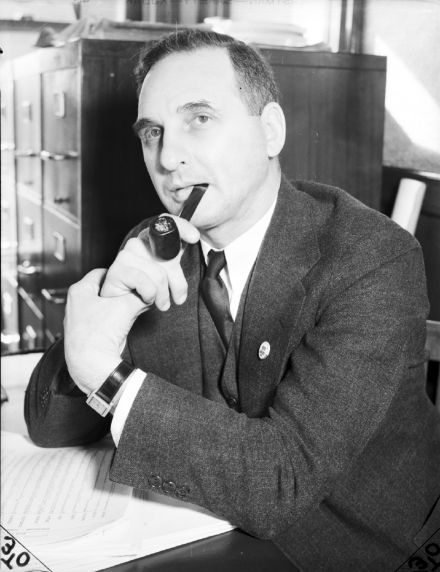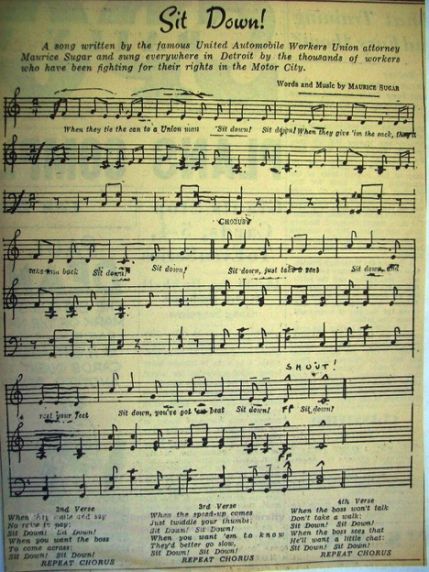Guest Post: More than a Lawyer - Maurice Sugar
“Music hath charms to sooth a savage heart, to soften rocks, or bend a knotted oak.” –William Congreve 1670-1729
This quote, among others, was scribbled on notes belonging to the famous and first Labor Lawyer –Maurice Sugar, and can be found in the Reuther Library’s Maurice Sugar Papers.
Maurice Sugar was born to Russian Jewish Immigrants in Brimley, Michigan in 1891. He was educated in several places around the state and attended the University of Michigan to study law. His involvement in socialist groups, along with his penchant for defending the poor, spurred him on to practice as a labor lawyer. By 1913 he represented nearly all Detroit area unions and was handling over two-hundred cases in the courts. In 1937 he was named Chief Legal Counsel of the United Automobile Workers, and remained at that post for eleven years. However, his life-long interest in music was sparked long before that.
As a boy, Maurice Sugar's mother encouraged him to learn the piano. While she had visions of her son becoming like the famous pianist Paderewski, he had other ideas. What captured his attention were the many folk tunes: “Turkey in the Straw,” “The Irish Washerwoman,” “The Arkansas Traveler,” and other popular tunes in his lumberjack town. So enraptured by the music coming from the saloons and dance hall across from his father’s store, he would sit and listen for hours. This love of folk music would stay with him for the rest of his life.
Even when deeply entrenched in the labor movement, Sugar still found time for music. He writes, "The advanced labor movement has laid heavy emphasis on the intellect. This is as it should be, of course men must be convinced, and it is our task to convince them. With the intellect we cut channels, we charter courses, we establish beacons. But we must learn that people will not take these channels, will not follow these courses, they will ignore these beacons unless they are profoundly moved, emotionally spurred. Music and song are vehicles of education in themselves –very important vehicles. Indeed, I am inclined to believe that there is no method of expression more eloquent, no type of appeal more potent than song and music." Sugar believed that it was necessary to know the American worker and to sing and play not only for them, but with them. He adapted his songs to the people as they are, and this is why they were so popular with labor strikers.
Two of his most famous songs are “The Soup Song” and “Sit-Down.” These songs were sung by workers across the United States and were performed along with music by his contemporaries: American opera composer Marc Blitzstein and American composer-songwriter Earl Robinson.
“The Soup Song” circa 1931 was written, as Sugar recalled, “…about 2 o’clock in the morning upon returning home from a speaking engagement at a “lodge” provided by the city of Detroit for homeless, destitute men. I think it has been the most widely sung of all the songs I have written. In 1932 I went on a lecture tour, covering most of the major cities from coast to coast—and the soup song was known and sung almost everywhere I went.” He also recounts “… during mealtime at the plant kitchens in the factories, long lines of workers would stand with soup bowls in their hands—singing the soup song with gusto”.
The Lyrics of the “Soup Song” are sung to the tune “My Bonnie Lies Over the Ocean.”
I’m spending my nights at the flop-house
I’m spending my days on the street.
I’m looking for work, and I find none;
I wish I had something to eat.
I spent 20 years at in the factory,
I did everything I was told;
They said I was faithful and loyal;
Now even before I get old:
Chorus
I saved 15 bucks with my banker
To buy me a car and a yacht;
I went down to draw out my fortune,
And this is the answer I got:
Chorus:
Soo—oup ---soo—oup ---They give me a bowl of sou—oo—oup!
soo—oup ---soo—oup ---They give me a bowl of soup!
Sugar recalls how another popular song came into being: “…I wrote the song “Sit-Down” during the avalanche of sit-down strikers which occurred in the early months of 1937. I was pretty busy in those days. Then as now, I was council for the United Automobile Workers, and in addition, I was attorney for the Detroit Federation of Labor, and for many of the new CIO Unions. “Sit-Down” was sung by the strikers in their meeting halls, and in the plant while the strike was in progress. In the plants, singing was part of the organized recreating of the workers and they frequently improvised musical bands, featuring accordions, mandolins, guitars, mouth organs, and now and then a saxophone. These bands went sled-length for folk songs…lots of hill-billy stuff….and lots of parodies. And they went for “Sit-Down” in a big way.”
While Maurice Sugar is well-known as a highly influential labor lawyer, few know how his love of music rallied union strikers together and kept their morale high. For those interested in researching Maurice Sugar, more information can be found in the Reuther Library’s Maurice Sugar Papers,
Ford Hunger March, 1932, and other UAW collections.
Additional Bibliography:
Johnson, C. H. (1988). Maurice Sugar: Law, labor, and the left in Detroit, 1912-1950. Detroit: Wayne State University Press.
Sugar, M. (1907-1973). Songs by Maurice Sugar. Maurice Sugar Collection (14). Walter P. Reuther Library, Wayne State University.
In the Winter 2014 semester, the Reuther Library worked with students in the Graduate Certificate in Archival Administration program at the Wayne State School of Library and Information Science to produce a series of student-written, guest blog posts featuring the Reuther’s collections.
Elizabeth Nicholson is now a graduate of the SLIS program and works at the Reuther as an Archival Technician as well as a Digital Archivist at Oakland Community College.



 Reddit
Reddit Facebook
Facebook LinkedIn
LinkedIn